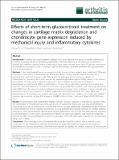Effects of short-term glucocorticoid treatment on changes in cartilage matrix degradation and chondrocyte gene expression induced by mechanical injury and inflammatory cytokines
Author(s)
Lu, Yihong C. S.; Evans, Christopher H.; Grodzinsky, Alan J.
Downloadar3456.pdf (742.2Kb)
PUBLISHER_CC
Publisher with Creative Commons License
Creative Commons Attribution
Terms of use
Metadata
Show full item recordAbstract
Introduction Traumatic joint injury damages cartilage and causes adjacent joint tissues to release inflammatory cytokines, increasing the risk of developing osteoarthritis. The main objective of this study was to determine whether the combined catabolic effects of mechanical injury, tumor necrosis factor alpha (TNFα) and interleukin-6 (IL-6)/soluble IL-6 receptor (sIL-6R) on cartilage could be abolished by short-term treatment with glucocorticoids such as dexamethasone. Methods In an initial dexamethasone-dose-response study, bovine cartilage explants were treated with TNFα and increasing concentrations of dexamethasone. Bovine and human cartilage explants were then subjected to individual and combined treatments with TNFα, IL-6/sIL-6R and injury in the presence or absence of dexamethasone. Treatment effects were assessed by measuring glycosaminoglycans (GAG) release to the medium and synthesis of proteoglycans. Additional experiments tested whether pre-exposure of cartilage to dexamethasone could prevent GAG loss and inhibition of biosynthesis induced by cytokines, and whether post-treatment with dexamethasone could diminish the effects of pre-established cytokine insult. Messenger ribonucleic acid (mRNA) levels for genes involved in cartilage homeostasis (proteases, matrix molecules, cytokines, growth and transcription factors) were measured in explants subjected to combined treatments with injury, TNFα and dexamethasone. To investigate mechanisms associated with dexamethasone regulation of chondrocyte metabolic response, glucocorticoid receptor (GR) antagonist (RU486) and proprotein convertase inhibitor (RVKR-CMK) were used. Results Dexamethasone dose-dependently inhibited GAG loss and the reduction in biosynthesis caused by TNFα. The combination of mechanical injury, TNFα and IL-6/sIL-6R caused the most severe GAG loss; dexamethasone reduced this GAG loss to control levels in bovine and human cartilage. Additionally, dexamethasone pre-treatment or post-treatment of bovine explants lowered GAG loss and increased proteoglycan synthesis in cartilage explants exposed to TNFα. Dexamethasone did not down-regulate aggrecanase mRNA levels. Post-transcriptional regulation by dexamethasone of other genes associated with responses to injury and cytokines was noted. GR antagonist reversed the effect of dexamethasone on sulfate incorporation. RVKR-CMK significantly reduced GAG loss caused by TNFα + IL-6 + injury. Conclusions Short-term glucocorticoid treatment effectively abolished the catabolic effects exerted by the combination of pro-inflammatory cytokines and mechanical injury: dexamethasone prevented proteoglycan degradation and restored biosynthesis. Dexamethasone appears to regulate the catabolic response of chondrocytes post-transcriptionally, since the abundance of transcripts encoding aggrecanases was still elevated in the presence of dexamethasone.
Date issued
2011-09Department
Massachusetts Institute of Technology. Department of Biological Engineering; Massachusetts Institute of Technology. Department of Electrical Engineering and Computer Science; Massachusetts Institute of Technology. Department of Mechanical EngineeringJournal
Arthritis Research and Therapy
Publisher
BioMed Central Ltd
Citation
Lu, Yihong C.S., Christopher H. Evans, and Alan J. Grodzinsky. “Effects of short-term glucocorticoid treatment on changes in cartilage matrix degradation and chondrocyte gene expression induced by mechanical injury and inflammatory cytokines.” Arthritis Research & Therapy 13 (2011): R142.
Version: Final published version
ISSN
1478-6362
1478-6354